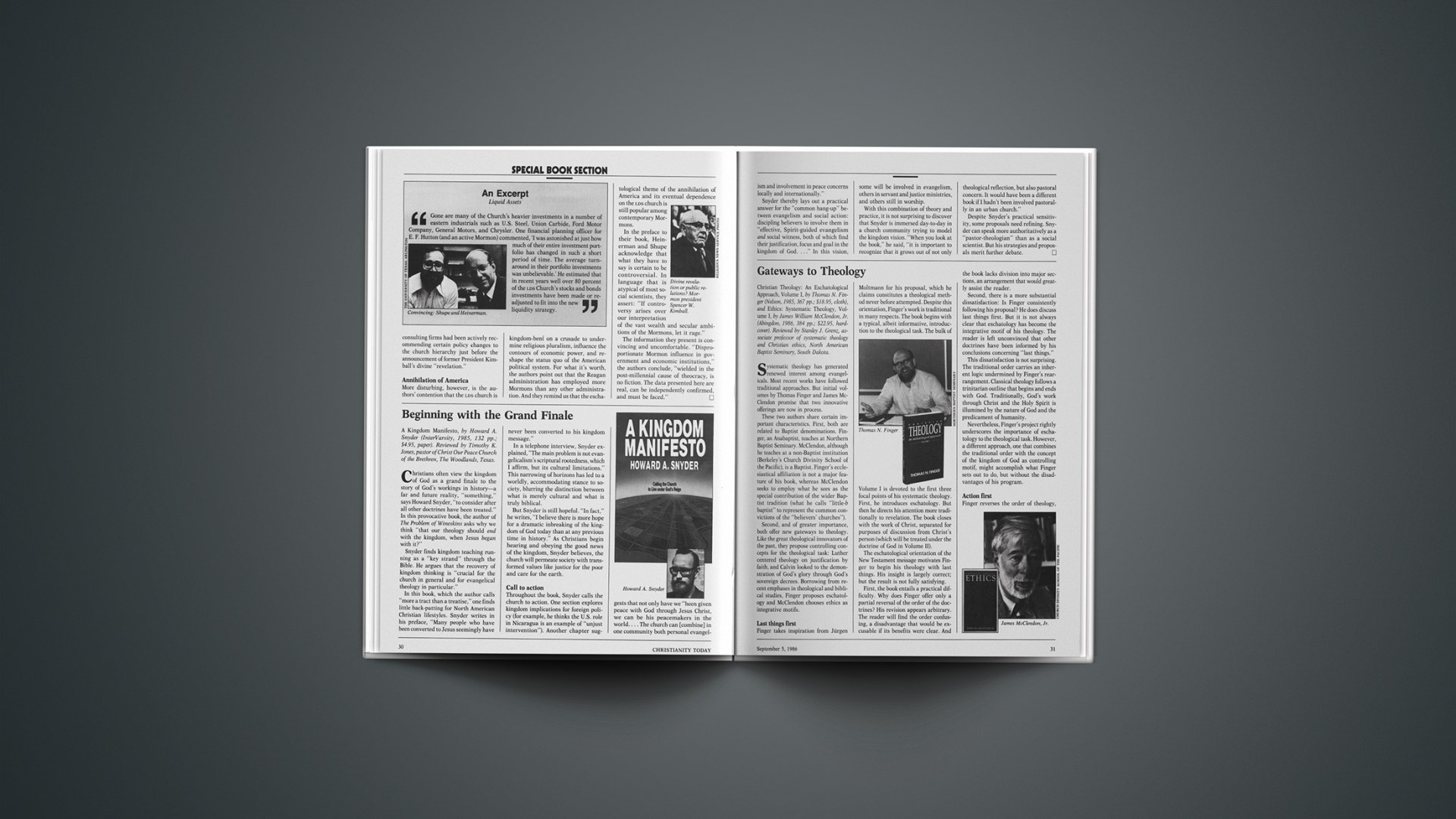Christian Theology: An Eschatological Approach, Volume I, by Thomas N. Finger (Nelson, 1985, 367 pp.; $18.95, cloth), and Ethics: Systematic Theology, Volume I, by James William McClendon, Jr. (Abingdon, 1986, 384 pp.; $22.95, hardcover). Reviewed by Stanley J. Grenz, associate professor of systematic theology and Christian ethics, North American Baptist Seminary, South Dakota.
Systematic theology has generated renewed interest among evangelicals. Most recent works have followed traditional approaches. But initial volumes by Thomas Finger and James McClendon promise that two innovative offerings are now in process.
These two authors share certain important characteristics. First, both are related to Baptist denominations. Finger, an Anabaptist, teaches at Northern Baptist Seminary. McClendon, although he teaches at a non-Baptist institution (Berkeley’s Church Divinity School of the Pacific), is a Baptist. Finger’s ecclesiastical affiliation is not a major feature of his book, whereas McClendon seeks to employ what he sees as the special contribution of the wider Baptist tradition (what he calls “little-b baptist” to represent the common convictions of the “believers’ churches”).
Second, and of greater importance, both offer new gateways to theology. Like the great theological innovators of the past, they propose controlling concepts for the theological task: Luther centered theology on justification by faith, and Calvin looked to the demonstration of God’s glory through God’s sovereign decrees. Borrowing from recent emphases in theological and biblical studies, Finger proposes eschatology and McClendon chooses ethics as integrative motifs.
Last Things First
Finger takes inspiration from Jürgen Moltmann for his proposal, which he claims constitutes a theological method never before attempted. Despite this orientation, Finger’s work is traditional in many respects. The book begins with a typical, albeit informative, introduction to the theological task. The bulk of Volume I is devoted to the first three focal points of his systematic theology. First, he introduces eschatology. But then he directs his attention more traditionally to revelation. The book closes with the work of Christ, separated for purposes of discussion from Christ’s person (which will be treated under the doctrine of God in Volume II).
The eschatological orientation of the New Testament message motivates Finger to begin his theology with last things. His insight is largely correct; but the result is not fully satisfying.
First, the book entails a practical difficulty. Why does Finger offer only a partial reversal of the order of the doctrines? His revision appears arbitrary. The reader will find the order confusing, a disadvantage that would be excusable if its benefits were clear. And the book lacks division into major sections, an arrangement that would greatly assist the reader.
Second, there is a more substantial dissatisfaction: Is Finger consistently following his proposal? He does discuss last things first. But it is not always clear that eschatology has become the integrative motif of his theology. The reader is left unconvinced that other doctrines have been informed by his conclusions concerning “last things.”
This dissatisfaction is not surprising. The traditional order carries an inherent logic undermined by Finger’s rearrangement. Classical theology follows a trinitarian outline that begins and ends with God. Traditionally, God’s work through Christ and the Holy Spirit is illumined by the nature of God and the predicament of humanity.
Nevertheless, Finger’s project rightly underscores the importance of eschatology to the theological task. However, a different approach, one that combines the traditional order with the concept of the kingdom of God as controlling motif, might accomplish what Finger sets out to do, but without the disadvantages of his program.
Action First
Finger reverses the order of theology, but McClendon reverses method. Traditional theology, he claims, begins with thought and then moves to action. In so doing, however, theology often stops short of ethics.
McClendon prefers to begin with the common life of the people of God and then move to the teaching that sanctions and supports it. Since this community life is narrative (it constitutes a continuing saga), story—and not decision—lies at the center of his ethics. These two beginning points—ethics and narrative—promise a new, and explicitly Baptist approach to theology, McClendon claims.
In keeping with this claim, Volume I centers not on specific abstract doctrines, but on ethics. After offering helpful insight into the definitions and relationship between ethics and theology, the author delineates three strands of ethics that must be integrated in Christian life: the organic (body ethics—especially sexuality), the communal (social ethics), and the anastatic (resurrection ethics—how believers live in the unique light of Christ). These three arise out of the believers’ situation as part of the natural order, a social fabric, and the kingdom of God.
The narrative approach to theology is apparent in each section as well. For each ethical sphere, a paradigm person is used as an extended illustration: Sarah and Jonathan Edwards, Dietrich Bonhoeffer, and Dorothy Day. These life histories underscore the “lived-out” nature of ethics/theology.
McClendon’s volume is a challenging work. His contention that community life and action rightly precede theological reflection is worth careful consideration. However, one wonders if the classical approach to the relation between theology and ethics, while rightly criticized by the author, nevertheless has some merit. At its best, theological statements, as reflections on our faith commitments, provide needed insight, motivation, and guidance for community life. McClendon’s reversal in method may tend to dislodge action from theological reflection.
Since both books are but the first installments of multivolume works, final evaluation must be withheld until the sets are complete. At this stage, however, one may safely conclude that both will offer significant challenges to traditional approaches. And both will constitute important contributions to the ongoing theological enterprise.










